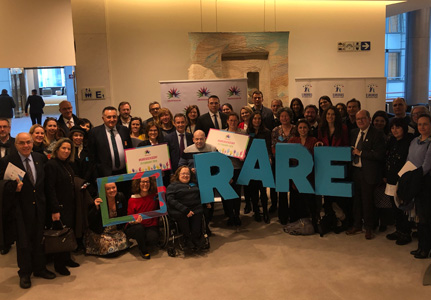Parliamentary Advocates for Rare Diseases working towards a new EU policy framework for rare diseases

At a Policy Event organised at the European Parliament in Brussels last month, EURORDIS re-launched the Network of Parliamentary Advocates for Rare Diseases, a group of European and national members of parliament advocating to improve the lives of the 30 million people living with a rare disease in Europe.
Hosted by MEPs Tanja Fajon, Stelios Kympouropoulos and Frédérique Ries and held to mark the occasion of Rare Disease Day, the EURORDIS ’Reframe Rare’ Policy Event brought together 70 participants to discuss current priorities for rare disease policy at the EU level.
Other MEPs including Kateřina Konečná and Tomislav Sokol also hosted conversations with patient representatives Claudia Crocione (HHT Europe), Mencia de Lemus Belmonte (SMA Europe) and Rebecca T. Skarberg (Osteogenesis Imperfecta Federation Europe), on topics including research and innovation, access to medicines, holistic care and cross-border healthcare and access to specialised care.
With this relaunch of the Network of Parliamentary Advocates for Rare Diseases, this group of MEPs commits to bring about a new EU policy framework on rare diseases and stronger EU-wide action in health, research, social affairs and other relevant policies.
Encourage your member of parliament to become a Parliamentary Advocate for Rare Diseases
Both members of your national parliament and members of the European Parliament are encouraged to join the network of Parliamentary Advocates for Rare Diseases.
If you would like to invite your local MP/ MEP to become a Parliamentary Advocate for Rare Diseases, contact kostas.aligiannis@eurordis.org for further information. Members of parliament from non-EU European countries are also encouraged to join the network.
Tanja Fajon, MEP for Slovenia, commented “I am a proud Parliamentary Advocate for Rare Diseases. Through my personal experience, I understand how challenging it can be to get a diagnosis and access appropriate medicines and healthcare. At our recent meeting we looked forward and considered how the EU can build a new policy framework that best serves its 30 million citizens affected by a rare disease.”
Yann Le Cam, Chief Executive Officer, EURORDIS, said, “With the support of the Parliamentary Advocates for Rare Diseases, we call on all stakeholders to join and move forward the conversation about a renewed EU framework for rare diseases based on the work of the Rare2030 Foresight Study, which was initiated by the European Parliament and funded by the European Commission.”
Fernanda’s story of living with alpha-1 antitrypsine deficiency
Patient advocate Fernanda participated in the Policy Event and shared her experience of a recent diagnosis of the rare disease alpha-1 antitrypsine deficiency with the event’s attendees. Here she tells us more about her story:
I am grateful that EURORDIS invited me to participate in the important discussion at the European Parliament for the relaunch of the Network of Parliamentary Advocates for Rare Diseases. It was a great opportunity to meet with other patients, healthcare providers and MEPs and to learn more about what is going on in Europe and the key priorities around rare diseases.
The event was extremely useful for me, to learn there is a lot being done with the European Reference Networks. We need to continue progress in that area and also to further develop the Networks at the national level.
I take away two clear messages from the event. One from MEP Kateřina Konečná: “Speak out! Now is the moment, speak to MPs and MEPs in your countries and reinforce the message about the importance to get European support for rare diseases!”
The other one from the Norwegian patient advocate Rebecca T. Skarberg: “Knowledge is key, knowledge is power, it is through knowledge that we will win the fight against rare diseases.”
I had to do a lot of research myself to find my way. For more than 2 years I thought that I had asthma and all of a sudden I had “alpha-1 antitrypsin deficiency”, a genetic condition that causes serious issues with my lungs. I was finally diagnosed in September 2019. My doctor told me that I was her first patient and she didn’t know about alpha-1. I had no idea what that meant for me and my family. I was lost, alone, scared … And then I found the association Alpha 1 Plus Belgium led by Frank, a patient like myself. And from that moment on I started to have hope, I felt understood and there was somebody ready to HELP. I still remember a note in his first email: ‘Don’t worry, I have the same disease as you and I am ok, you will be ok too’. I cried when reading it, I felt relieved.
The disease has led to a lot of changes in my life, from adjusting my diet to doing more sport, as well as to learning more about the situation of rare diseases in Belgium and Europe. I am now getting more involved with patient associations such as Alpha-1 Plus Belgium, RaDiOrg (the Belgian national alliance for rare diseases) and also EURORDIS.
Belgium stopped reimbursing the treatment I need in 2010. Patients diagnosed after then have no access to treatment. We should aim to ensure patients everywhere in Europe can access the treatment. Based on my own experience, I also think there is still work to do around patients’ access to cross-border healthcare.
Fernanda manages international relations for Alpha-1 Plus Belgium and is a member of the RaDiOrg Advisory Group.
Eva Bearryman, Senior Communications Manager, EURORDIS
